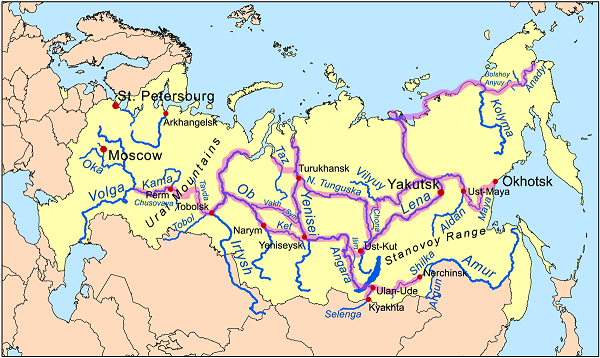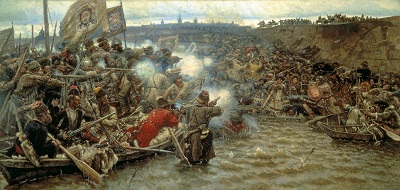“. . . a fearful scurvy showed itself among the troops, a disease common to those who arrive in cold and damp climates, in savage and almost uninhabited countries.”
Today’s installment concludes The Cossacks Conquer Siberia,
Featuring an excerpt from History of the Russian State by Nikolay M. Karamzin published in 1826.
Previously in The Cossacks Conquer Siberia. Now we continue.
Time: 1581
Place: Siberia

CC BY-SA 3.0 image from Wikipedia.
While awaiting good news from Russia, the conquerors of Siberia did not give themselves up to a sterile repose. They advanced by the Tavda as far as the country of the Vogulitches, and near the mouth of that river where the Tartar princes Labutan and Petschenieg held sway. In a bloody engagement Yermak put them to flight on the shores of a lake; and the annalist reports that at his time many human bones were still to be seen there. But the timid inhabitants of the cantons of Koschutz and of Tabarin paid the tribute demanded by the Cossack leader without a murmur. These peaceful savages lived in an absolute independence, having neither princes nor chiefs. They only gave their respect to certain rich men, whose wisdom was generally recognized, and took them as judges in their quarrels. They yielded an equal esteem to some pretended soothsayers. One of these, gazing upon Yermak with a holy terror, predicted long glory for him, but kept silence about his approaching death. Here fable creates new giants among the dwarfs of Vogulie, who are scarcely two archines in height. According to one of these stories, the Russians saw with surprise, near the town of Tabarin, a giant two fathoms tall, who seized a dozen men at a time and smothered them in his arms. Not being able to take him alive, they killed him with gunshots.
On the whole, the relation of this latter expedition is not very authentic, and is only found in the supplement to the Chronicles of Siberia. One may also read there that, after having reached the marshes and forests of Pelim, dispersed the Vogulitches, and made numerous prisoners, Yermak sought to gather from the latter certain information regarding the roads which lead from the banks of the Upper Tavda to Perm, across a chain of rocky mountains, in order to discover a less dangerous and less difficult communication with Russia, but that it was impossible to open a road in deserts swampy in summer and buried under deep snows in winter. Yermak succeeded in increasing the number of his tributaries, and in extending his domains as far as the shore of Sosva, in the ancient country of Yugorie. He had enclosed in their limits the country of Kondinie, little known up to that time, although long placed among the titles of the Muscovite sovereigns. He then returned to the capital of Siberia, where he awaited the recompense of his glorious works.
John Koltzo had arrived at Isker, charged with the bounties of the Czar, followed by Prince Bolkovsky with his warriors. The former gave rich presents to the leaders as well as to the soldiers. He was the bearer, for Yermak, of two cuirasses, a cup of silver, and a cloak which the Czar had worn himself. In a letter full of goodness, Ivan announced to the Cossacks his entire forgetfulness of their faults and the eternal recognition of Russia for their important services. He affirmed that he appointed Yermak prince of Siberia, commanding him to administer and govern that country, as he had already done up to that time; to establish order there, and, in fine, to consolidate there the supreme power of the Czar. On their side, the Cossacks rendered honors to the waywodes of Ivan as well as to all the strelitz. They made them presents of sables and treated them with all the luxury which their position permitted, preparing together for new enterprises. However, this happiness of Yermak and his companions was not of long duration; we touch upon the beginning of their reverses.

Public domain image from Wikipedia.
In the first place, a fearful scurvy showed itself among the troops, a disease common to those who arrive in cold and damp climates, in savage and almost uninhabited countries. The strelitz were attacked first. Soon it was communicated to the Cossacks, many of whom lost their strength and their life. Next, winter brought a great dearth of food. The excessive cold, tempests, snow-storms, hindered the hunting and fishing as well as the arrival of grain from the neighboring encampments, some inhabitants of which occupied themselves with a poorly productive agriculture. Famine began to be felt; disease made progress and continually took off many victims, among whom was Prince Bolkovsky. They gave him an honorable funeral at Isker. The general weakness seized the heart of Yermak also. He feared not death, long accustomed to brave it, but he was afflicted with the idea of losing his conquest, of betraying the hopes of the Czar and of Russia. Happily this calamity ceased with spring. The atmospheric heat helped the cure of the diseases, and convoys of provisions restored plenty among the Russians. Then Yermak made Prince Mahmetkul start for Moscow, announcing to the Czar that, while all was going on well in Siberia, yet he asked immediately for more considerable aids than the first, in order to preserve his conquests and to be able to make new ones. Mahmetkul, faithful observer of the law of Mahomet, served afterward in the Russian armies.
Yermak resolved to intimidate his enemies and to guarantee his safety for the future. To this effect, although he had but a feeble troop left, he undertook to pursue Karatcha, ascending the Irtysh in order to extend the possessions of Russia toward the east. He overthrew Prince Beghiche and captured his city, of which the ruins may still be seen on the shores of a sinuous lake, near the mouth of the Vogai. He made himself master of all the country which stretches as far as the Ischim, terrifying by his vengeance those who dared resist him, and sparing those who lay down their arms. In the country of Sargaty there lived an illustrious old man, a former Tartar chief, a hereditary judge of all the tribes since the first khan of Siberia. He made the act of submission as well as Prince Etichai, who governed the city of Tehend. The latter, bearing tribute to Yermak, presented his young daughter, betrothed to the son of Kutchum. But the hetman, a rigid observer of the laws of chastity, sent the young girl home. Near the mouth of the Ischim, a bloody quarrel arose between the soldiers of Yermak and the wild inhabitants of that wretched country, in which five brave Cossacks lost their lives. Their memory is still celebrated in the melancholy songs of Siberia. The little town of Tachatkan also fell into the power of the Russians. Their chief did not judge it advisable to attack a more important place, founded by Kutchum, on the banks of the lake Aussaklu. He penetrated as far as the shore of Chische, where the deserts begin; imposed tributes on this new conquest, and returned to take to Isker the spoils which were to be his last trophies.
| <—Previous | Master List |
This ends our series of passages on The Cossacks Conquer Siberia by Nikolay M. Karamzin from his multi-volume book History of the Russian State last volume published in 1826. This blog features short and lengthy pieces on all aspects of our shared past. Here are selections from the great historians who may be forgotten (and whose work have fallen into public domain) as well as links to the most up-to-date developments in the field of history and of course, original material from yours truly, Jack Le Moine. – A little bit of everything historical is here.
More information here.

833496 642293But wanna admit that this really is quite useful , Thanks for taking your time to write this. 538058